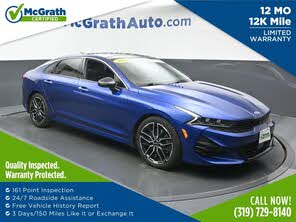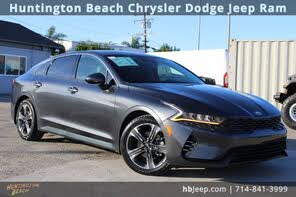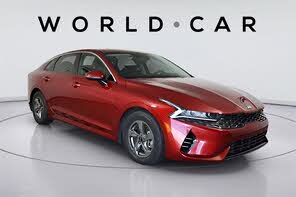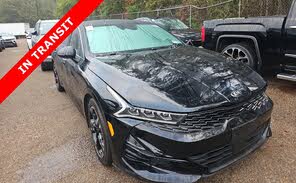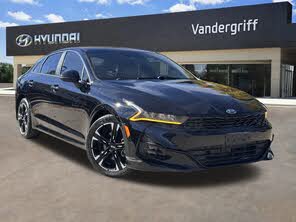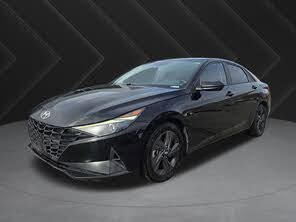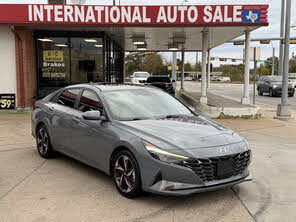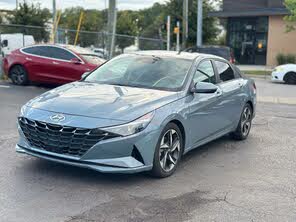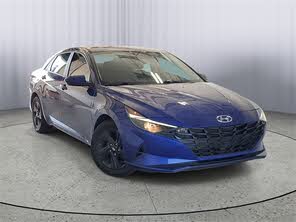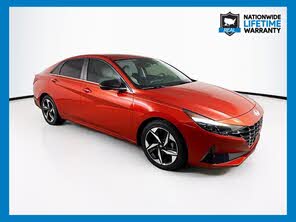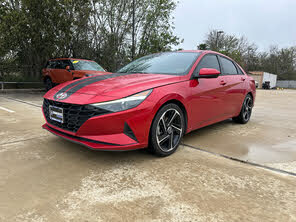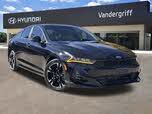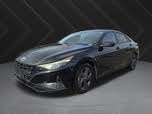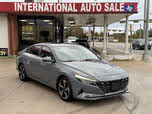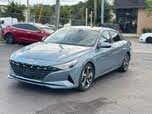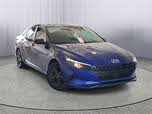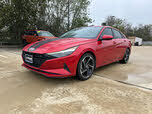2021 Kia K5 vs 2021 Hyundai Elantra
Overview | |
MSRP$19,650 | MSRP$23,590 |
Listings652 | Listings894 |
Ratings & Reviews | |
User Reviews | User Reviews |
Expert reviews8.8 out of 10 | Expert reviews7.7 out of 10 |
Pros
Cons
| Pros
Cons
|
2021 Hyundai Elantra Reviews SummaryCompact cars are no longer compact. Cheap cars are no longer cheap. And it is no longer necessary to buy a luxury vehicle for performance, technology, and sophistication. The redesigned 2021 Hyundai Elantra proves it. | |
2021 Kia K5 Reviews SummarySedans are now the most exciting new cars in the mainstream market. They are to crossovers today what craft beer was in the early 2000s. They’re not on every corner anymore because Americans prefer trucks over cars, but sedans like the 2021 Kia K5 are refreshing to see, surprisingly good to drive, and will make you look cultured and smart without having to try. The K5—and its new name—replaces the Optima and upgrades nearly everything in the pursuit of style and performance. It’s one of the best midsize sedans out there. | |
Popular Features & Specs | |
Engine2.0L 147 hp I4 | Engine1.6L 180 hp I4 |
Drive TrainFWD | Drive TrainFWD |
Seating Capacity5 | Seating Capacity5 |
Horsepower147 hp @ 6200 rpm | Horsepower180 hp @ 5500 rpm |
MPG City31 | MPG City27 |
MPG Highway41 | MPG Highway37 |
Engine | |
Engine Name2.0L 147 hp I4 | Engine Name1.6L 180 hp I4 |
Torque132 lb-ft @ 4500 rpm | Torque195 lb-ft @ 1500 rpm |
Horsepower147 hp @ 6200 rpm | Horsepower180 hp @ 5500 rpm |
DrivetrainFWD | DrivetrainFWD |
Fuel Economy | |
MPG City31 | MPG City27 |
MPG Highway41 | MPG Highway37 |
Interior | |
Seating Capacity5 | Seating Capacity5 |
Safety | |
Front Crash Overall | Front Crash Overall4 |
Side Crash Overall | Side Crash Overall5 |
Dimensions & Capacity | |
Cargo Space14.2 cu ft | Cargo Space16.0 cu ft |
Curb Weight2725 lbs | Curb Weight3115 lbs |
Height55.7 in | Height56.9 in |
Length184.1 in | Length193.1 in |
Width71.9 in | Width73.2 in |
Wheelbase107.1 in | Wheelbase112.2 in |
Maximum Payload1133 lbs | Maximum Payload1239 lbs |
Number of doors4 | Number of doors4 |
Overview | ||
MSRP | $19,650 | $23,590 |
Listings | ||
Ratings & Reviews | ||
User reviews | ||
Expert reviews | 8.8 out of 10Read full review | 7.7 out of 10Read full review |
Pros & cons | Pros
Cons
| Pros
Cons
|
Summary | Compact cars are no longer compact. Cheap cars are no longer cheap. And it is no longer necessary to buy a luxury vehicle for performance, technology, and sophistication. The redesigned 2021 Hyundai Elantra proves it. | Sedans are now the most exciting new cars in the mainstream market. They are to crossovers today what craft beer was in the early 2000s. They’re not on every corner anymore because Americans prefer trucks over cars, but sedans like the 2021 Kia K5 are refreshing to see, surprisingly good to drive, and will make you look cultured and smart without having to try. The K5—and its new name—replaces the Optima and upgrades nearly everything in the pursuit of style and performance. It’s one of the best midsize sedans out there. |
Video | ||
Popular Features & Specs | ||
Engine | 2.0L 147 hp I4 | 1.6L 180 hp I4 |
Drive Train | FWD | FWD |
Seating Capacity | 5 | 5 |
Horsepower | 147 hp @ 6200 rpm | 180 hp @ 5500 rpm |
MPG City | 31 | 27 |
MPG Highway | 41 | 37 |
Engine | ||
Engine Name | 2.0L 147 hp I4 | 1.6L 180 hp I4 |
Torque | 132 lb-ft @ 4500 rpm | 195 lb-ft @ 1500 rpm |
Horsepower | 147 hp @ 6200 rpm | 180 hp @ 5500 rpm |
Drivetrain | FWD | FWD |
Fuel Economy | ||
MPG City | 31 | 27 |
MPG Highway | 41 | 37 |
Interior | ||
Seating Capacity | 5 | 5 |
Safety | ||
Front Crash Overall | 4 | |
Side Crash Overall | 5 | |
Dimensions & Capacity | ||
Cargo Space | 14.2 cu ft | 16.0 cu ft |
Curb Weight | 2725 lbs | 3115 lbs |
Height | 55.7 in | 56.9 in |
Length | 184.1 in | 193.1 in |
Width | 71.9 in | 73.2 in |
Wheelbase | 107.1 in | 112.2 in |
Maximum Payload | 1133 lbs | 1239 lbs |
Number of doors | 4 | 4 |
The 2021 Hyundai Elantra stood out among compact sedans, thanks to its adoption of Hyundai’s Sensuous Sportiness design philosophy accentuated by Parametric surfacing. This resulted in sharp creases and dramatic angles that wove a visually unique and appealing pattern into the vehicle's aesthetic. Particularly striking was the Z-shaped indentation in the car’s doors, a design choice that broke conventional norms but added a distinctive character, as explained by Davis Lee, a senior designer at Hyundai.
Depending on the trim level—SE, SEL, N Line, and Limited—the new Elantra’s appearance improved dramatically, particularly with the availability of a hybrid powertrain in the SEL and Limited trims for an additional $2,650. Prices for the Elantra ranged from $19,650 to $25,450, excluding destination charges. While just a small percentage of eco-minded buyers opted for the hybrid model, Hyundai had plans to introduce the high-performance Elantra N early in 2021, estimated to cost under $34,000.
Inside, the driver-focused dashboard and center console in the Elantra featured a clear division between driver and passenger areas, enhanced by an angled passenger cornering grip. Higher trims notably improved the cabin experience with better materials and technology. The Limited and Hybrid Limited interiors, especially in Gray, created a contrast with the darker elements of the cabin, contributing to an affluent and modern ambiance reminiscent of Scandinavian designs.
Alternately, the Elantra SEL with the Premium Package had a more subdued interior with black finishes, leatherette door panel inserts, and noticeable glossy black plastic that detracted slightly from the upscale feel of higher trims.
The 2021 Kia K5, formerly known as the Optima, marked a new direction for Kia’s brand identity. The K5’s design was reminiscent of the performance-oriented Kia Stinger, especially in the GT-Line trim with flat Wolf Gray paint and striking red seats. This trim recalled an Audi A5 Sportback, an intentional design choice led by Peter Schreyer, Kia’s chief designer who significantly influenced the aesthetics of Kia and Genesis vehicles.
The K5 featured a long, ovoid-shaped rear window merged seamlessly into a short tail with polished black trim enveloping the thick D-pillars, giving an impression of a fastback even though it had a traditional trunk. Unique details like dashed LED taillights emphasized the K5's broader stance, an inch wider than the outgoing Optima.
Despite having some faux air vents and exhaust tips, the K5’s proportions contributed to its sporty yet elegant look. It had a lower and longer profile compared to its predecessor, with an extra two inches added to its wheelbase. The aggressive front design with Z-shaped amber LED running lights, a honeycomb grille, and stacked LED fog lights further accentuated the car’s visual appeal. The base 16-inch wheels, however, made the K5 look less striking, so opting for larger wheels was advisable for maximized style.
Inside, the dashboard was divided between the driver and passenger, featuring a Supra-style divider and an angled center stack, contributing to a driver-centric layout. The GT-Line trim sported red seats with black accents, a flat-bottom steering wheel, and polished black interior trim, enhancing its sporty feel. The overall quality and attention to detail were commendable, with leading-edge design elements missing in many GM and Ford interiors.


















We drove nearly every Elantra powertrain combination, which included various models: the standard engine, the Hybrid, the sporty N Line, and the high-performance Elantra N. Here’s a breakdown:
Elantra SEL: Our Elantra SEL Premium with a 2.0-liter 4-cylinder engine produced 147 horsepower and 132 pound-feet of torque paired to a CVT. This combination achieved an EPA rating of 35 mpg in combined driving, but our real-world experience yielded 31.4 mpg. Around town, the Elantra felt athletic and nimble, though it lacked oomph for highway merging and passing. Still, the ride was quiet and refined, with well-tuned suspension mitigating the limitations of the beam-axle rear.
Elantra Limited Hybrid: Priced at $29,095, this model combined a 1.6-liter engine with an electric motor for 139 horsepower. It employed a smooth six-speed dry DCT and achieved 42.2 mpg in our tests, short of its EPA-rated 50 mpg due to mountainous terrain. The hybrid felt agile with instant torque and demonstrated impressive cornering with a flat attitude and non-howl tires.
Elantra N Line: Priced at $26,245, this sporty variant had a 201-horsepower, 1.6-liter turbo engine, coupled with a six-speed manual or seven-speed DCT. The N Line offered an engaging driving experience with its sporty suspension, multi-link rear, performance tires, and robust torque. Our shorter drive resulted in 23.1 mpg.
Elantra N: This high-performance model, priced around $34,000, featured a turbocharged 2.0-liter engine with 276 horsepower and 289 lb-ft of torque, mated to either a six-speed manual or eight-speed wet DCT. The Elantra N wowed us with its responsive handling, aggressive acceleration, and refined ride, earning high praise for its dynamic driving capabilities.
The K5 didn’t quite match the athleticism suggested by its aggressive GT-Line styling. Here’s how it performed:
GT-Line: The GT-Line, powered by a standard 1.6-liter turbocharged four-cylinder engine outputting 180 horsepower and 195 lb-ft of torque, lacked the verve of a true sports sedan. Its suspension with softer damping and Pirelli P Zero All-Season tires didn’t handle tight turns with much compliance. The ride, however, was balanced and isolated with good brakes and responsive steering, but it fell short on handling finesse. Fuel economy was commendable at nearly 36 mpg over 750 miles, close to its EPA estimate of 31 mpg combined.
GT: This variant promised more with a potent 2.5-liter turbocharged engine cheering out 290 horsepower and 311 pound-feet of torque. Unfortunately, it was only FWD, without handling aids like a limited-slip differential, which could spell trouble in delivering power effectively. Despite these concerns, the K5's GT trim aimed to enhance performance and driving pleasure significantly.
The EPA classified the 2021 Elantra as a midsize car due to its spaciousness. Its interior offered consistently height-adjustable driver’s seat and tilt/telescopic steering wheel across all trims, ensuring comfort. Heated front seats were standard, and the Limited Hybrid also boasted ventilated front cushions. However, the loss of a height-adjustable front passenger seat and the continued use of hard plastic on upper door panels were drawbacks.
In the rear, the Elantra provided ample legroom as claimed by Hyundai. The backseat offered generous leg clearance and foot space, but the slightly angled backrest compromised upper back support. Additionally, amenities like air conditioning vents or USB ports were missing.
Storage solutions were practical, with dual-stage adjustable cupholders and a 14.2-cubic-foot trunk. The 60/40 split rear seat enhanced utility, and high trims included a hands-free trunk lid release feature, though Hyundai omitted a grab handle inside the trunk for this model year.
Despite its fastback design, the K5 accommodated two rear adult passengers comfortably, thanks to scalloped roof portions and front seatbacks offering adequate headroom and legroom. Rear air vents were a notable omission, but overall comfort was still commendable.
The front seats proved supportive and firm, ideal for long journeys. Kia's thoughtful design included hard buttons for essential functions, a secure wireless charging pad, and straightforward operation of the infotainment system. The 16-cubic-foot trunk provided ample cargo space, expandable via folding rear seats.
With SE, SEL, and N Line trims, the Elantra sported traditional instrumentation coupled with an 8-inch touchscreen infotainment system featuring volume and tuning knobs, along with wireless Apple CarPlay and Android Auto. SEL and N Line trims added satellite radio, Blue Link connected services, and wireless smartphone charging for the N Line.
The Limited trim elevated the tech game with a 10.25-inch touchscreen infotainment system paired with a 10.25-inch digital instrumentation screen under a single glass piece. This setup, enhanced with a 64-color ambient lighting system and dynamic voice recognition, offered advanced navigation and split-screen Apple CarPlay and Android Auto features. A new Bose premium sound system greatly enhanced the audio experience, and Hyundai Digital Key enabled smartphone-based entry and ignition.
The K5 simplified setup with wireless Apple CarPlay and Android Auto standard. Despite occasional minor glitches, it made tech integration seamless. Standard features included LED headlights, dual-zone climate control, lane-keep assist, and an acoustic laminated windshield, though the base LX trim lacked folding rear seats and push-button start.
The LXS trim introduced essentials like proximity entry, remote start, and Smart Trunk. The GT-Line upgraded to 18-inch wheels, added fog lights, turn signals on mirrors, rear USB ports, power driver’s seat, and sophisticated LED taillights. The Premium package optioned a panoramic sunroof, adaptive cruise control, and advanced LED projector headlights.
The EX trim included ventilated seats, rear air vents, a Bose stereo system, and a 10-inch infotainment system, while the GT brought paddle shifters, 19-inch wheels, and quad exhaust tips. Advanced voice command features in the infotainment upgrade added further functionality compatible with Amazon Alexa and Google Assistant.
Hyundai built the 2021 Elantra on a new platform designed to channel collision energy effectively away from the cabin. It came equipped with SmartSense, Hyundai’s suite of ADAS systems. Standard features included forward collision warning, automatic emergency braking, lane departure warning, lane-keeping and centering assistance, auto high-beam headlights, and driver attention warning.
Additional systems like blind-spot warning and rear cross-traffic warning were standard across the lineup, along with Rear Occupant Alert and Safe Exit Warning systems. Higher trims introduced cyclist detection, junction turning assistance, adaptive cruise control with stop-and-go, rear automatic braking, and Hyundai’s Level 2 ADAS, Highway Drive Assist, which offered impressive smoothness and accuracy.
Although too new to be rated by NHTSA or IIHS, the K5 was expected to perform well thanks to its robust chassis and body shell. Standard safety features were abundant, including rear side airbags, forward emergency braking with pedestrian detection, lane-keep assist, a driver attention monitor, and blind-spot monitoring with Safe Exit Assist.
Cyclist detection and Junction Turning were part of the GT-Line Premium package, while rear emergency braking and parking sensors became available from the EX trim upward. The K5's safety configurations promised to offer ample protection and advanced functionalities.
CarGurus highlights

According to CarGurus experts, the overall rating for the 2021 Hyundai Elantra is 8.8 out of 10, while the 2021 Kia K5 scores 7.7 out of 10. The Hyundai Elantra’s blend of distinctive design, advanced interior technology, varied powertrains, and comprehensive safety features make it a superior choice in this comparison. While the Kia K5 offers a visually appealing and comfortable ride, it falls short in performance and some interior amenities compared to the Elantra. Therefore, based on these ratings and features, the 2021 Hyundai Elantra is the recommended buy for those seeking a standout sedan experience.
Choose the 2021 Kia K5 if:
- You need a midsize sedan with a sporty yet elegant exterior and comfortable interior for adults.
- You value a seamless technology integration with wireless Apple CarPlay and Android Auto as standard features.
- You seek a vehicle with a more aggressive styling reminiscent of performance-oriented models.
Choose the 2021 Hyundai Elantra if:
- You want a distinctive, sharp design with advanced interior features across various trims.
- You prefer a hybrid option that balances performance with fuel efficiency.
- You seek a high-performance variant like the Elantra N to satisfy driving enthusiasts.
CarGurus highlights

According to CarGurus experts, the overall rating for the 2021 Hyundai Elantra is 8.8 out of 10, while the 2021 Kia K5 scores 7.7 out of 10. The Hyundai Elantra’s blend of distinctive design, advanced interior technology, varied powertrains, and comprehensive safety features make it a superior choice in this comparison. While the Kia K5 offers a visually appealing and comfortable ride, it falls short in performance and some interior amenities compared to the Elantra. Therefore, based on these ratings and features, the 2021 Hyundai Elantra is the recommended buy for those seeking a standout sedan experience.
Choose the 2021 Kia K5 if:
Shop Now- You need a midsize sedan with a sporty yet elegant exterior and comfortable interior for adults.
- You value a seamless technology integration with wireless Apple CarPlay and Android Auto as standard features.
- You seek a vehicle with a more aggressive styling reminiscent of performance-oriented models.
Choose the 2021 Hyundai Elantra if:
Shop Now- You want a distinctive, sharp design with advanced interior features across various trims.
- You prefer a hybrid option that balances performance with fuel efficiency.
- You seek a high-performance variant like the Elantra N to satisfy driving enthusiasts.

By: CarGurus + AI
At CarGurus, our team of experienced automotive writers remain at the heart of our content operation, conducting hands-on car tests and writing insightful guides that are backed by years of industry experience. To complement this, we are harnessing AI to make our content offering more diverse and more helpful to shoppers than ever. To achieve this, our AI systems are based exclusively on CarGurus content, ratings and data, so that what we produce is both unique to CarGurus, and uniquely helpful to car shoppers.

